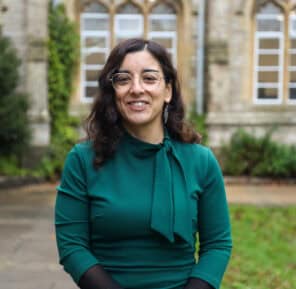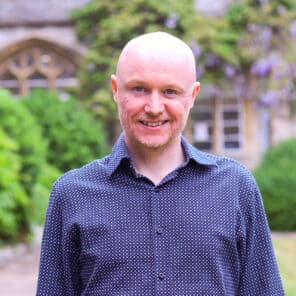2nd
for learning resources
National Student Survey 2025
Top 10
in the UK for student satisfaction in Psychology
Complete University Guide League Tables 2025
4th
for Applied Psychology
National Student Survey 2025
Overview
Explore the brain, behaviour and the human experience on an integrated master's degree
Our MSci Advanced Applied Psychology degree allows you to engage with all areas of psychology and gain a scientific understanding of the mind, brain, behaviour and experience, as well as the complex relationship between them.
National Student Survey 2023
Learning resources
Student voice
Mental wellbeing and communication
Gain a master’s level qualification
This integrated master’s degree programme combines undergraduate and postgraduate study into a single course, as you start your studies at BSc level and graduate with a level 7 qualification equivalent to an MSc at the end of your fourth year.
Explore all areas of psychology
Throughout your studies, you will explore the core principles that underline everyday human experience, as you examine how certain behaviours can be explained using psychological constructs and methods of investigation.
Study core principles including:
- Biological psychology
- Cognitive psychology
- Developmental psychology
- Individual difference psychology
- Mental health and forensic psychology
- Social psychology.
Apply your new clinical skills in your final year
During your final year, you will use all the knowledge and skills that you will have developed across the first three years of your degree to focus on a specialist scientific research project, as you learn to become a successful professional researcher in psychology.
Prepare for your future career or further study within psychology
Our MSci Advanced Applied Psychology degree is perfect if you are considering a career in a psychology-related field and acts as an excellent foundation for research work at doctoral level (PhD) or a professional doctoral programme in psychology.
Undertake your own practical research
Using our range of specialist psychology equipment and facilities, you will use your own practical research and analytic skills to explain everyday experiences and complete experiments to enhance your learning.
You are also encouraged to select your own dissertation project and research method in your final year with a dedicated supervisor to support your individual approach, and you can also volunteer as a research assistant in the Psychology Department.
Small teaching groups for more personalised support
Our small, interactive seminars mean you are seen as an individual, not just another face in the crowd as our lecturers get to know you and how best to support your academic and personal development.
Learn from expert and experienced practicing researchers
All our lecturers are active researchers or practitioners alongside their teaching roles, meaning that they bring their knowledge and research directly into the classroom with them, so you can be sure that you are engaged in the latest from the field of Psychology.
Accreditation
Our BSc (Hons) Psychology course is accredited by the British Psychological Society (BPS), which means you’ll graduate with an industry-recognised qualification ready that acts as a first step to becoming a psychologist.

On this course you will:
- Explore all areas of psychology as you engage with complex, real-world problems.
- Gain a master's level qualification perfect for careers within psychology or for further study.
- Investigate psychological principles and theories using advanced research methods.
- Learn from research-active and experienced lecturers who get to know you and your needs.
- Choose your own research dissertation topic with the support of a dedicated, expert supervisor.
- Have the opportunity to volunteer as a Research or a Teaching Assistant in the psychology department.
- Learn on a BPS-accredited course and take the first step to becoming a psychologist.
The Course
Develop an in-depth understanding of the psychological principles and theories
Year One
In your first year, you will explore the fundamental principles of psychology studies as you begin to explore the science of our everyday experiences, and learn the key research methods and skills you will use throughout your degree.
Year Two
Your second year will expand your knowledge of all areas of psychology and further develop your experiment design, research analysis and criticism skills.
Year Three
In your third year, you will apply your skills and understanding to a variety of real-world contexts, as you develop your professional research skills ahead of your final year project on a topic of your choice.
Year Four
Your final year acts as the culmination of your learning across your degree, as you look to apply all your knowledge and skills to a final research dissertation project of your choice.
Alongside this, you will continue to develop your advanced research skills and techniques as you look to implement your own experiments to underpin your project.
Choose to specialise in a range of practical applications
In addition to the modules below, you will be able to select additional optional modules to specialise in the practical application of theory to a range of disciplines including sport and exercise, health, business, marketing, early years, education and the creative arts.
Indicative modules
You will study a selection of core and optional modules during your degree. Each module is worth a particular number of credits and is delivered differently depending on the needs of the module.
Modules
Select a year
Social Minds: Exploring Human Interaction
The module will explore the experience of relationships through the processes related to forming an impression of people, feeling attracted or not to them, wanting to be their friend, getting to know them and forming a relationship with them, through a variety of behaviours, such as approaching them, talking to them, and meeting them socially.
Psychological theories and empirical findings from investigations into impression formation will be introduced, and methodology will be explored.
Thinking Like a Social Scientist: Study and Research Skills
This module will introduce you to research skills that are essential for your academic success and growth. It introduces you to the basics of data analysis and covers key concepts in time management and teamwork. You’ll develop your critical thinking skills to enhance your ability to present convincing arguments in written work, and your academic reading skills will also develop to enable you to access complex scientific reports.
Additionally, the module will teach you how to produce high-quality assessments, including creating references and citations using APA style, presenting information effectively, and writing well-structured essays.
Sports Exercise Psychology in Action
Interacting with others is a natural occurrence in everyday life. The aim of this module is to explore and develop essential interpersonal skills that applied practitioners require as they engage in person-to-person interactions and develop sound working relationships.
You will explore effective verbal and non-verbal communication, learning how messages are conveyed and interpreted. Through a range of teaching strategies, you will be taught to understand the skills necessary to navigate complex interpersonal interactions.
Additionally, you will explore individual and contextual differences when interacting in group and one-to-one contexts.
By the end of the module, you will gain a comprehensive understanding of the psychological processes behind human interaction and how to apply these skills in both academic and applied contexts.
Facilitating Wellbeing: Positive Perspectives
Based on the discipline of Positive Psychology, the module will explore the experience of living well, relating the need to understand well-being, emotions, motivation, aspirations and goals to self-development, personality traits, needs for achievement, self-efficacy, and self-esteem, environmental influences and the enhancement of well-being.
Psychological theories and empirical findings from investigations into needs, motivation and traits will be introduced, as will the use of selected nonparametric statistics.
This module aims to give you an understanding of a broad area of everyday functioning and experience in terms of the behaviours, feelings, attitudes, and mental processes involved in that experience.
The module also aims to use functional analysis so that a broad experience can be broken down into a series of questions concerning the sub-functions and behaviours involved, allowing the psychological constructs and theories that are associated with those behaviours to be elucidated and explored. Exploration will involve appropriate methods to investigate what psychological constructs and theories relate to relevant behaviours and function.
The module will explore the experience of positive psychology relating the need to understand one’s own motivation, aspirations, and goals to self-development, personality, need for achievement, self-efficacy and self-esteem.
Psychological theories and empirical findings from investigations into emotions, traits and environments will be introduced and non-parametric methodology will be explored.
Mind and Machine
The module aims to develop an understanding of a broad area of everyday functioning and experience in terms of the behaviours, feelings, attitudes and mental processes involved in that experience.
You will use functional analysis so that a broad experience can be broken down into a series of questions concerning the sub-functions, psychological states and behaviours involved, allowing the psychological constructs and theories that are associated with those states and behaviours to be elucidated and explored.
Exploration will involve appropriate methods to investigate what psychological constructs and theories relate to relevant behaviours and function.
The Science of Behaviour: Theory to Evidence
This module introduces the conceptual and historical issues in psychology, as well as the work of prominent figures who have influenced the development of modern psychology. You will begin to explore key thinkers in psychology, focusing on how key thinkers design and conduct research in their field.
Human Cognition and Individual Differences
This module explores how we think (Cognitive Psychology) and how we differ from one another (Individual Differences).
The aim of this module is to introduce you to basic theory, research findings and methods of investigation in perception, attention, learning, memory, face and object recognition and problem-solving.
Developmental Psychology
Developmental Psychology involves the study of development and maturation in cognitive, personality and social processes.
The aim of this module is to introduce you to fundamental theory, research findings and methods of investigation in infancy, childhood, adolescence, adulthood and overall lifespan development.
The module will aim to provide a critical understanding of ways in which behaviour is influenced by developmental factors, the nature of developmental processes, and ways in which empirical research can help us to understand how developmental processes influence what we do.
Research Methods: Experimental Design and Analysis
The module aims to develop an understanding of experimental designs and associated methods of analysis related to psychology, and introduces you to research ethics. The introduced methods are variants of Analysis of Variance (ANOVA), a method that allows comparison of groups and/or conditions.
Biological Psychology
Biological Psychology involves the study of the biological and psychological bases of mind and behaviour.
This module will introduce you to basic theory, research findings and methods of investigation in behavioural genetics, neuroscience and neuropsychology.
The module will aim to provide a critical understanding of the ways in which behaviour is influenced by biological factors, how we study these biological processes and why these processes are important in applied psychological settings.
Legal and Forensic Psychology
In this module, you will have the opportunity to explore a comprehensive range of key constructs, theories, and research in mental health and forensic psychology.
We will examine the numerous ways that psychological research, methods, and expertise are applied to both the study of psychopathology and to issues that come before the legal system.
Different types of criminal law will be discussed, and case studies will be used to consider how these might be dealt with.
Research Methods: Survey & Qualitative Designs and Analysis
The module aims to develop an understanding of survey and qualitative designs and associated methods of analysis related to psychology.
The module will develop knowledge of survey and qualitative approaches to investigating and analysing psychological data. The relationship between correlational analysis and predictive reasoning will be outlined. Areas covered include multivariate analysis (multiple regression) and thematic analysis.
Independent Project
The Independent Project provides an opportunity to apply appropriate knowledge, concepts, techniques and research methods of psychology to an in-depth study of a particular question or problem related to psychology.
This module aims to foster a greater understanding of the processes involved in undertaking a research project and marks the culmination of your learning experience.
The study will enable you to produce a written research report, and a poster presenting a summary of your research and findings.
Project Management and Presentation Skills
This project will support you to develop a wide range of skills, from project management, to the ability to present your research results in an accessible form. You will develop your scientific reasoning and reporting skills and produce a poster to present your research work.
Professional Skills in Clinical Settings
Professional Skills in Clinical Settings aims to put theory into practice. This module aims to introduce and explore important aspects in clinical settings and the role of the therapeutic relationship.
Interviewing skills in clinical settings will be explored in relation to the strengths and weaknesses of structured and semi-structured interview methods. You will gain experience of participating in a recorded interviewing session in the role of interviewer.
In this module, you will participate in a supervised administration of a standardised intelligence test that will give experience of and insight into psychological assessment typically conducted by child psychologists, educational psychologists, clinical psychologists and occupational psychologists.
Applied Organisational Psychology
This module aims to provide a critical understanding of organisational psychology, as well as introduce and explore important aspects of the working environment, their relationship to psychological reactions in employees, and consequent job and organisational performance.
The ways in which psychologists work with business and industrial organisations will be outlined, and the career pathways of work and organisational psychologists explained.
Cultural and Social Issues in Psychology
The module will provide an introduction to psychological and interdisciplinary studies, with a focus on issues of current social and cultural concern. The areas of diversity, power and conflict in society, economic and consumer society, reproductive health matters, environmental issues, health and illness will be investigated in terms of underlying theory and empirical research.
By integrating insights from psychology about people from other cultures, the module aims to contextualise the knowledge gained throughout the course, fostering a fuller, deeper, and richer understanding of psychology.
Dissertation
The dissertation provides you with an opportunity to show evidence of your ability to: identify problem areas, locate issues within a wider context, obtain relevant data, analyse findings, work within relevant theoretical/conceptual frameworks, synthesise complicated material, employ relevant and innovative research approaches and present findings in an accessible manner.
Advanced Applied Social and Health Psychology
The module will explore cutting-edge developments and issues in applied psychology. You will apply psychological research to real-world issues: for example, group violence, health, education, persuasion, media and advertising, industry (as faculty availability allows).
During this module, you will critically appraise interventions for children and adults and also consider how psychology can be used in the conduct of everyday life (e.g. at home, in the workplace, in education and in health care settings).
Advanced Research Methods and Approaches
The module will engage you with an in-depth and critical knowledge of advanced applied research design and associated analytical techniques, developing an advanced understanding of cutting-edge applied research skills and designs in psychology and criminology.
The module is designed to equip you with a wide range of methodological skills to conduct research of high quality and impact in your chosen fields, enabling you to become successful professional researchers in your applied discipline.
Clinical Psychology, Life Coaching, and Technological Applications
This module further develops your understanding of underlying theory and enhances your experience with practical skillsets across a wide range of professional psychology careers, including advanced research.
You will cover aspects of psychotherapy and clinical diagnosis, life coaching/mentoring skills, and work with a wide range of technical equipment with psychological applications.
You will also critique approaches to psychotherapy and clinical diagnosis, gain a good foundation in functional analysis of psychological problems, evaluate coaching/mentoring, gain experience in working with technical equipment such as Virtual Reality software and fNIRS, while further developing critical assessment and report writing skills.
Teaching and Assessment
Feel the support of our experienced and expert staff
Smaller class sizes for better learning
You will build your subject knowledge and practical experience through lectures, workshops and tutorials in small classes, which means our expert teaching staff really get to know you and what support you need.
Peer-assisting learning for even more support
Students in their third year often act as teaching assistants in first- and second-year classes to help ensure that no-one falls behind, as they offer extra help available if you don’t feel confident to raise your hand.
Contact time
Each module has three hours of contact time per week. You will study four modules per semester, so you will have 12 contact hours per week including lectures, seminars and workshops.
Learn more about our teaching staff
Professor Antonina Pereira
CPsychol, PhD, FHEA, AFBPsS
Executive Dean Faculty of Social Sciences & Humanities
Professor of Neuropsychology and Neuroscience
Director – People & Well-Being in The Everyday (POWER) Research Centre
Principal Investigator – Cognitive Ageing and Dementia Research Lab
Moitree Banerjee
Moitree is the Head of School of Law, Business and Psychology and Reader in Clinical Psychology
Esther Burkitt
Esther is a Chartered Psychologist, a Chartered Scientist, an Associate Fellow of the British Psychological Society, and a Fellow of the Higher Education Academy.
Esther is Year 1 Academic Adviser for Psychology students, as well as the Admissions Tutor for many courses within the department.
Karen Rodham
Karen has a wealth of university teaching experience, having held posts across well-respected institutions since 1995.
Karen’s research revolves around how to better support people who are coping with complex and long-term physical conditions, with a focus on qualitative approach to data collection and analysis.
Ian Tyndall
Dr Ian Tyndall is a cognitive-behavioural psychologist in the Department of Psychology.
Ian’s research is particularly focused on experimental investigations of cognitive and behavioural processes underpinning clinical psychology conditions.
Ian is the Study Abroad officer and the Employability Officer for the Department.
Roy Spina
Roy completed his BSc in Psychology at University of British Columbia, before undertaking his MSc and PhD in Social and Personality psychology at Queen’s University (Canada), acquiring a strong background in research methodology and statistics, with an emphasis on quantitative experimental research.
In addition to being Academic Advisor and Research Degrees Co-ordinator, Dr Spina is the Research Lead for the department.
Rachel King
Rachel leads several second-year modules in the Department, in addition to supervising extended project qualification and BSc dissertation projects.
Currently, Rachel is interested in the functional impact of prospective memory deficits and the potential of hyperthermic conditioning for slowing the progression of cognitive decline in Alzheimer’s disease.
She is also a graduate member of the British Psychological Society.
Dr. Valentina Canessa-Pollard
Valentina is Head of BSc Counselling Psychology Programme, a Fellow of the Higher Education Academy, and a Chartered Psychologist with British Psychological Society.
Valentina’s research interest centre around human non-verbal communication and sexual violence prevention and recovery.
Assessments
You will be assessed through a range of assignments including:
- Scientific reports
- Essays
- Exams
- Group and individual presentations
- Poster design
- Research participation.
You may also be assessed on in-class debates, quizzes and how you apply analytical techniques to problem solving.
Experience
Discover our range of specialist research equipment and facilities
Brain Imaging Unit and Neuroimaging: NIRScout
Our neuroimaging system with a 3D scalable ultra-high-density near-infrared spectroscopy platform measures changes in the cerebral cortex using NIRScout and NIRx Medical Technologies.
Eye tracking software
Our specialist eye tracking software allows you to track shifts in visual attention and can be used for attentional retraining purposes.
Virtual Reality Unit and Immersive Suite
Suite including an affective immersive emotional Virtual Reality stimuli package that allows researchers to create different worlds for Neuroscience Research using aLIAS and Vizard.
Advanced Physiological Data Acquisition system
Our specialist advanced data acquisition system allow you to measure physiological activity from the brain, heart and motor neuron pathways with Biopac software.
Specialist Advanced Research Software
Software for measuring and manipulating a broad range of psychological constructs; Inquisit, Qualtrics, Noldus Observer XT, E-prime, Superlab and Nvivo.
Learning Resource Centre
The Learning Resource Centre (LRC) contains the library, a café, IT/teaching rooms and the Support and Information Zone (SIZ).
Library
Our campus library holds more than 200,000 books and over 500,000 eBooks.

Rylee
Study Abroad
Explore the opportunity to study part of your course abroad
As a student at the University of Chichester, you can explore opportunities to study abroad during your studies to enrich your educational experience.
It’s a chance to broaden your horizons, a great opportunity to meet new people, undertake further travelling and to immerse yourself within a new culture.
You will be fully supported throughout the process to help find the right destination and institution for you and your course. We can take you through everything that you will need to consider, from visas to financial support, to ensure you get the best out of your time studying abroad.
Careers
Where you could go after your studies
British Psychological Society registration
Our MSci Advanced Psychology degree qualifies for Graduate Basis for Registration (GBR) with the BPS, which gives you a recognised foundation to progress to specialist areas of psychology and eventually become a Chartered Psychologist.
There are currently 10 professional divisions within the BPS including Clinical Psychology, Educational Psychology, Sport and Exercise Psychology. Each of these pathways has a professional training programme which starts with attaining a GBR.
Other career options
As well as providing a basis for work as a professional psychologist, a psychology degree provides a good insight into human behaviour that will equip you with the skills to work in a wide range of fields.
Your psychology degree could lead to a career in:
- Industry
- Media
- Teaching
- Work with children, adults and families
- IT
- Computing
- Marketing
- Civil Service.
Course Costs
Course Fees 2026/27
UK fee - Years 1, 2 & 3
UK fee - Year 4
International fee
EU/EEA Fee Reduction Scholarship
EU/EEA students automatically pay the equivalent of UK fees via the EU/EEA Fee Reduction Scholarship
For further details about fees, please see our Tuition Fee page.
For further details about international scholarships, please see our Scholarships page.
To find out about any additional costs on this course, please see our Additional Costs page.
Entry Requirements
Typical offers (individual offers may vary):
UCAS
A Levels
BTEC/Cambridge Technical
Access to HE Diploma
GCSEs
IB
IELTS
Are you interested in this course and would like to learn more? Please email Professor Esther Burkitt on e.burkitt@chi.ac.uk for admissions queries.
Non-standard Application Entry Routes
The University has an alternative entry route for applicants who have relevant skills and experience but who do not hold the formal minimum entry qualifications required. Applicants who demonstrate the necessary skills and experience to enter a course of higher education will be asked to complete an entry task involving the completion of specially set assignments.
Do you have any questions about the entry requirements? Contact our Admissions Team.
Contextual offers
We believe everyone deserves an equal opportunity to pursue higher education, regardless of their background.
When we receive your application we consider your personal circumstances and the factors surrounding your achievements to see if you are eligible for a contextual offer. This is an offer with a reduced entry tariff – typically the equivalent of 16 fewer UCAS points (two A-level grades).
Find out more about our contextual offers.












